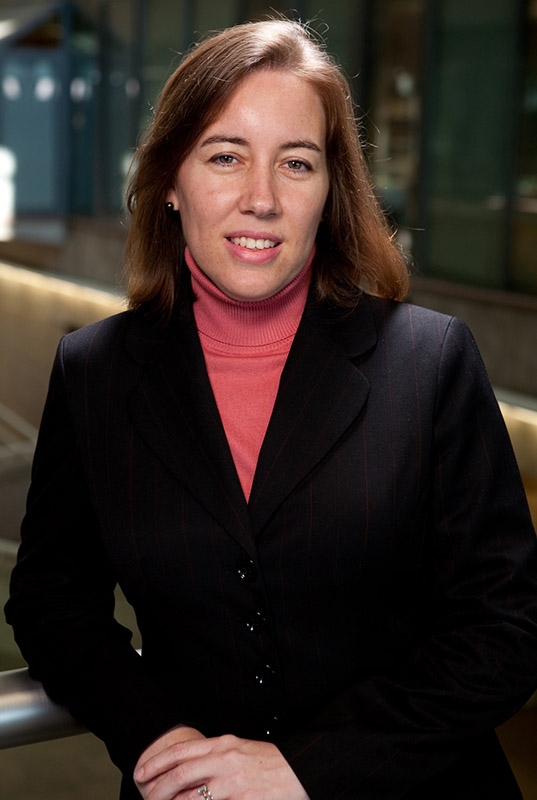'TransMap' Will Ensure Reliable and Efficient Transportation Networks
FAYETTEVILLE, Ark. – The Transportation and Maritime Analytics Partnerships Hub, or “TransMap,” will leverage big data – information gleaned from a massive network of interconnected devices – to provide real-time, interactive maps and other geospatial data that will help government agencies and industry plan, build and maintain transportation infrastructure.
Over the next three years, researchers at the University of Arkansas will use a $1.5 million award from the U.S. Department of Transportation Maritime Administration to develop TransMap. The research will include new systems and technologies, made possible by the so-called “Internet of Things,” that will ensure a reliable and efficient transporation network, including roads and highways, rail lines and waterways.
“Efficient, resilient and sustainable multimodal transportation is a national priority,” said Heather Nachtmann, professor of industrial engineering and director of the U of A-led Maritime Transportation Research and Education Center, or MarTREC. “Forward-thinking policymakers understand that we must rely on large-scale datasets, which already exist, to meet the challenges of our nation’s complex and ever-changing transportation system.”
Nachtmann and colleagues Justin Chimka and Chase Rainwater, associate professors of industrial engineering; Jackson Cothren, professor of geosciences and director of the Center for Advanced Spatial Technologies; and Jim Kruse, director of the Center for Ports & Waterways at Texas A&M Transportation Institute, will exploit existing smart technologies and software to develop a new, integrated system that will capture, curate and disseminate high volumes of data in visual format. TransMap will be a “visual decision space,” as Nachtmann calls it, an interactive map and decision-support tool that will help transportation officials plan and manage infrastructure, while also giving ordinary citizens a powerful tool to efficiently evaluate increasingly complex transportation networks.
“The role of visual realism in communicating and understanding spatial change and process is critical in making good decisions about building, managing and maintaining transportation infrastructure,” Nachtmann said.
The researchers will rely on the so-called “Internet of Things,” a rapidly developing system of interrelated computing objects and devices with embedded sensors and on-board data processing and communication systems that provide automated services that would otherwise would not be possible. Rather than a single technology, the Internet of Things involves the convergence of sensors, actuators, information and communication technologies that work together to collect and aggregate information and enable intelligent systems to understand context and track and manage complex interactions.
MarTREC is one of 20 centers nationwide designated as a Tier 1 University Transportation Center, which refers to the level of grant funding from the U.S. Department of Transportation. The center is a consortium of researchers from Jackson State University in Mississippi, Louisiana State University, the University of New Orleans, Vanderbilt University, Texas A&M University, and the Texas A&M Transportation Institute. MarTREC researchers are nationally recognized experts in maritime and multimodal transportation, which integrates trucking, rail and barge carriers.
This funding was secured largely by the efforts of U.S. Sen. John Boozman. “Senator Boozman personally played a large role in conveying the university’s unique capabilities to ensure this important program was funded,” Nachtmann said.
Nachtmann is associate dean for research in the College of Engineering. She holds the Earl J. and Lillian P. Dyess Endowed Chair in Engineering.
About the University of Arkansas: The University of Arkansas provides an internationally competitive education for undergraduate and graduate students in more than 200 academic programs. The university contributes new knowledge, economic development, basic and applied research, and creative activity while also providing service to academic and professional disciplines. The Carnegie Foundation classifies the University of Arkansas among only 3 percent of colleges and universities in America that have the highest level of research activity. U.S. News & World Report ranks the University of Arkansas among its top American public research universities. Founded in 1871, the University of Arkansas comprises 10 colleges and schools and maintains a low student-to-faculty ratio that promotes personal attention and close mentoring.
Contacts
Heather Nachtmann, professor and associate dean
College of Engineering
479-575-3484, hln@uark.edu
Matt McGowan, science and research communications officer
University Relations
479-575-4246,
dmcgowa@uark.edu
